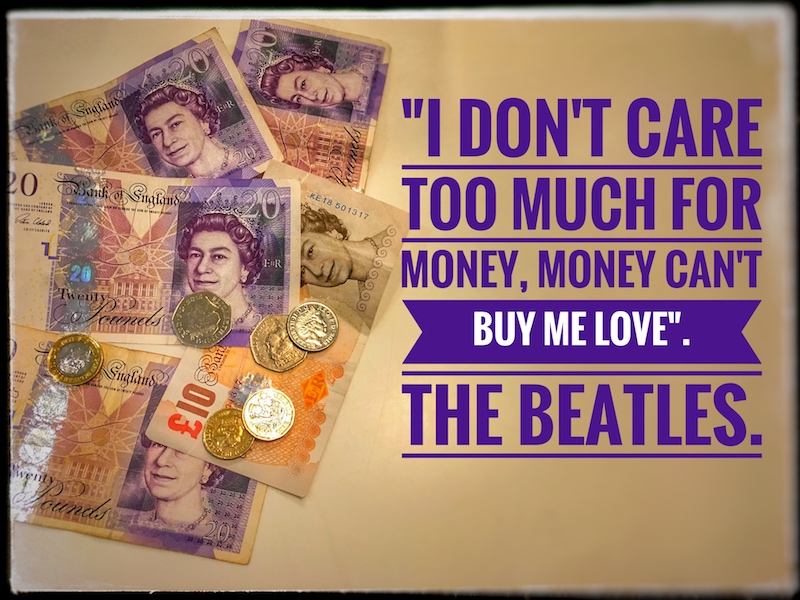
Money and Happiness. It’s complicated. We’d all be so much happier if we had more money…right? Well, as it turns out, that may not be exactly true. Research shows, that above a certain base level (the exact figure varies from study to study), there is zero correlation between money and happiness. Luxury maybe a quick fix but it seems it’s not the root to happiness (despite what the advertising industry tries to tell us).
Last week, my adventures with the Happynesshub took me to my first ever Action for Happiness Event. I eagerly arrived at Conway Hall, ready to listen to Claudia Hammond (a brilliant author, psychology lecturer and broadcaster) speak on the relationship between money and happiness.
Throughout her talk, Claudia urged us to stop seeing money as a “tool for doing things”. According to Claudia, the moment that we stop idolising money, is the moment that we can turn the often-fraught relationship between money and happiness, into a happy and healthy one.
Claudia drew the audience’s attention to the various shortcomings that we are all guilty of when it comes to our love-hate relationship with money:
- The Planning Fallacy: We always see the future as a utopia. I am certainly guilty of this. ‘What’s another £10 if I’m going to be paid next week?’ It always seems as though the future holds more time and more money for all of us. But alas, reality isn’t about living in the future (or the past for that matter) says Claudia. We need to live in the NOW. The moment we analyse our financial situation from the present tense, is the moment that we are able to be realistic, make better choices, and in turn, maximise our wellbeing both in the short-run and long-run.
- The Hedonic Treadmill: I, as much as the next person, love a fancy meal out in town. If I had my way (and if my bank account allowed), I’d be eating out every evening. But once again, Claudia’s wise words of wisdom have since permeated my brain. She reminded us, that whatever the experience or commodity (big or small, expensive or not), we soon become accustomed to what we already have. There is in fact such a thing as having ‘too much of a good thing’. Research suggests that people with less money appear to appreciate small experiences more. Suddenly, assuming the position of resident glutton seems much less appealing. By all means we should treat ourselves, but it would seem that moderation is the key to happiness and gratitude.
- Terminal Materialism: What is this? Very simply, it’s when we purchase items as a means to gain status – quite often in doing so, negative outcomes occur. In a world where social media tries to determine our social status, it seems all too tempting to buy that designer pair of shoes for the ‘likes’ on Instagram. Claudia urges us to rewire our brains to become instrumental materialists. In other words, make purchases on the basis of how happy they make US while being mindful of their utility. I.e. there’s little point in buying a flashy sports car (however glossy it may be), if you require a car big enough to pile all your children in for the school run. The moment we worry about our own needs and are able to drop the terminal materialist façade, is the moment that our happiness is said to exponentially increase.
- Product Passion: I admit that I love stuff. Stuff being, clothes, mini irrelevant ornaments for my windowsill and bath bombs, to name a few. You could say that I have a passion for products. These sorts of things, to a degree do make me happy. However, more often than not, the initial happiness from my purchase quickly fades and I’m left craving the next item that I could do without. Claudia’s next tip was to try and spend our hard earned money on experiences. As a keen traveller, I agree. At the risk of sounding corny, experiences really do last a lifetime. Why not immortalise your money? As Happy Guru Matt Killingsworth says,”happiness may have more to do with the contents of our moment-to-moment experiences than with the major conditions of our lives.” By spending your money on experiences, you are gaining happiness from two key routes: anticipation and memories. Experiences are something for us to look forward to; they motivate us to press on with the monotony of every day life. Afterwards, they leave us with happy memories, which unlike that brand new jacket, won’t wear out or go out of fashion.
So, what have I learnt? The answer is lots. I’ve learnt that being critical of your buying habits doesn’t have to be a depressing exercise. Instead, by honestly analysing my materialist tendencies and understanding that the things I want aren’t what I need, Claudia helped me to see how I can maximise my wellbeing and make myself much happier with just a few easy tips to keep in mind.
By Kaira Shetty
